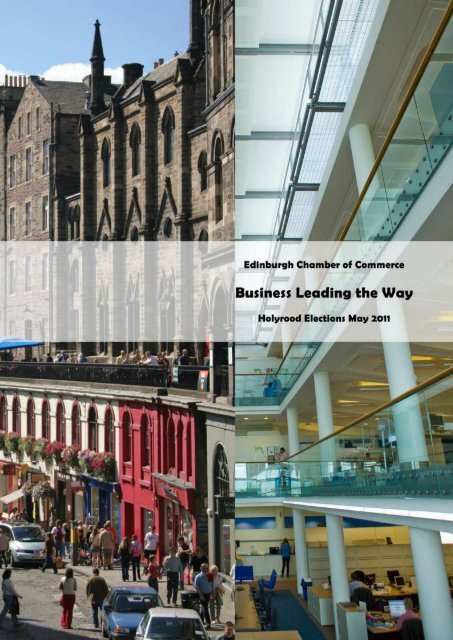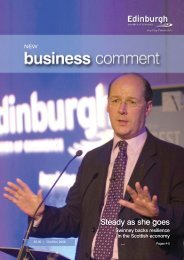Untitled - The Edinburgh Chamber of Commerce
Untitled - The Edinburgh Chamber of Commerce
Untitled - The Edinburgh Chamber of Commerce
You also want an ePaper? Increase the reach of your titles
YUMPU automatically turns print PDFs into web optimized ePapers that Google loves.
In recent decades Scotland has suffered from low<br />
economic growth, high public spending, low rates <strong>of</strong><br />
business formation and low public sector productivity.<br />
<strong>The</strong>se problems are interconnected, and so must be the<br />
solutions to them.<br />
As the leading business organisation in Scotland,<br />
<strong>Chamber</strong>s <strong>of</strong> <strong>Commerce</strong> urge Scotland’s political<br />
leadership to use this election as an opportunity for<br />
reform. This document sets out the changes we believe are<br />
necessary to set Scotland and its capital on a road<br />
towards accelerating our ambition to have a more<br />
dynamic, innovative and prosperous future.<br />
<br />
This document <strong>of</strong>fers a radical set <strong>of</strong> ideas to revitalise the economy <strong>of</strong><br />
<strong>Edinburgh</strong> and Scotland. It focuses on policy that is devolved to the Scottish<br />
Parliament, particularly provision <strong>of</strong> infrastructure and public services.<br />
However, the Scottish Government must work closely with its counterparts in<br />
local government and at Westminster and Brussels. We believe in all these<br />
institutions policy must be underpinned by commitment to deliver growth in<br />
the current economic climate, ensuring recovery. <strong>The</strong>ir roles overlap, and the<br />
Page 1 <strong>of</strong> 19
scope <strong>of</strong> this document correspondingly covers matters such as tax, planning<br />
and economic development. It addresses five main areas:<br />
<br />
<br />
<br />
<br />
<br />
A new approach to government in <strong>Edinburgh</strong> and Scotland, reforming<br />
public sector pay and conditions and introducing new structures in<br />
public services;<br />
A public/private partnership for growth, including tax cuts, less<br />
regulation, and fundamental changes to education and skills provision;<br />
<strong>The</strong> infrastructure <strong>of</strong> growth, supporting ten transport priorities<br />
including High Speed Rail and completing the <strong>Edinburgh</strong> tram project;<br />
<strong>The</strong> engines <strong>of</strong> growth, with ideas to promote <strong>Edinburgh</strong>’s key industrial<br />
sectors.<br />
Realising our ambition to be the European leader in renewable energy<br />
and achieving a low carbon future.<br />
Introduction: Global aspirations for <strong>Edinburgh</strong> and Scotland<br />
<strong>The</strong> 2011 Scottish election is the most important since devolution. <strong>The</strong> financial crisis<br />
and subsequent recession inflicted severe damage on the economy. How we<br />
accelerate our ambition to recover from that is the issue at stake at the polls.<br />
It is not simply a question <strong>of</strong> tightening our belts and waiting for growth to resume.<br />
We must learn from the mistakes <strong>of</strong> the past. In particular, we must use the<br />
necessity <strong>of</strong> restoring our public finances to reshape the way our economy is<br />
structured. <strong>The</strong> interest charges on the UK government‟s borrowing are currently<br />
one and a half times the entire Scottish Budget (£46.2bn in 2010 vs. Scottish Budget<br />
peaking just under £30bn in 2010, and now falling). Our unfunded pensions' deficit<br />
sits at over £66bn (figure for 2008/9) and an annual contribution <strong>of</strong> some £2.2bn or<br />
9% <strong>of</strong> the Scottish budget. (Figures from Audit Scotland April 2010). <strong>The</strong>se are not<br />
sustainable burdens.<br />
<strong>Edinburgh</strong> is a city with unique strengths and a global outlook. Our membership<br />
competes with the best from around the world and aspires to be world-beating. We<br />
believe that Scotland and its government should do the same.<br />
Page 2 <strong>of</strong> 19
Growth and Recovery<br />
Prosperity comes from wealth creation and innovation by business in the<br />
private sector. To recover fully from the recession we must encourage<br />
Scottish business to flourish and generate the jobs and growth to pull the<br />
Scottish economy and Scottish society into a new era.<br />
<strong>The</strong>re is no doubt that the biggest opportunity for growth is the export market.<br />
Whilst we struggle to achieve 1-2% growth China has already bounced back to<br />
10%. And there are Reasons to be Cheerful: Germany and France are enjoying<br />
significant growth rates. International trade is the great hope for Scotland’s<br />
economy.<br />
<strong>The</strong> City <strong>of</strong> <strong>Edinburgh</strong> can play a major role in this. <strong>Edinburgh</strong> has many <strong>of</strong> the<br />
attributes to flourish in the modern globalised economy – high tech, high<br />
skilled and high value industries, superb cultural amenities, and good<br />
education at both the research and schooling levels. <strong>Edinburgh</strong> and the<br />
Lothians account for 21% <strong>of</strong> Scottish GVA, with a contribution per capita 60%<br />
above the national average. <strong>The</strong> city has the potential to act as a beacon <strong>of</strong><br />
high achievement in Scotland, Europe and the wider world.<br />
<strong>The</strong> Holyrood elections <strong>of</strong> 2011 provide an opportunity for our political<br />
leadership to set an ambitious new agenda designed to promote private sector<br />
led growth and civic reform. This document <strong>of</strong>fers ideas to reshape Scottish<br />
society so that the necessity <strong>of</strong> reform becomes an opportunity for a wealthier<br />
and more harmonious Scotland.<br />
It looks first at prospects for reforming the public sector, which we believe is<br />
essential if we are to improve service provision while resolving our budget<br />
difficulties. <strong>The</strong> opportunity exists to reshape government in the interests <strong>of</strong><br />
the service user while at the same time allowing greater space for private<br />
sector growth.<br />
We then turn to creating a new partnership between government<br />
and business in Scotland to mould policy to maximise business<br />
potential. Thirdly, we address the crucial questions <strong>of</strong> infrastructure<br />
which are essential to a modern economy on the geographic fringes<br />
<strong>of</strong> its key marketplaces. Finally we look at some <strong>of</strong> the key<br />
industries that <strong>of</strong>fer such promise for <strong>Edinburgh</strong> and<br />
Scotland in the future.<br />
Page 3 <strong>of</strong> 19
Section 1: A new approach to government in <strong>Edinburgh</strong> and Scotland<br />
<strong>The</strong> recession and government measures to rescue the financial system led to<br />
severe budget deficits and high levels <strong>of</strong> public debt. We believe that these need to<br />
be tackled to reduce interest payments and maintain confidence in our economy.<br />
<strong>The</strong> UK government‟s plans to balance the budget over the next four years are a<br />
sensible framework for achieving stable public finances.<br />
Within that period, the Scottish Government must find savings <strong>of</strong> at least ten per<br />
cent. <strong>Edinburgh</strong> <strong>Chamber</strong> <strong>of</strong> <strong>Commerce</strong> believes that this target is moderate and<br />
achievable. <strong>The</strong> right approach is to seek productivity improvements in the public<br />
sector which will allow savings to be made without raising taxes or cutting investment<br />
in vital economic infrastructure.<br />
Public spending in Scotland is already 15% higher than the UK average after a<br />
decade <strong>of</strong> increased spending. Meaningful reform <strong>of</strong> public institutions would allow<br />
front line services to be maintained at a higher level than elsewhere in the UK while<br />
still leaving room for capital investment and low taxes. Within the public sector there<br />
are good examples <strong>of</strong> how to do this, and we encourage the adoption <strong>of</strong> best<br />
practice. <strong>The</strong> opportunity is there for a rebalanced economy with lower overall public<br />
spending allowing higher growth and more efficient services in the future. In any<br />
business- private or public there are always efficiency gains to be made.<br />
It is vital that within this mix the Scottish Government retain political engagement<br />
with the business community. <strong>The</strong> private sector cannot be expected to lead the<br />
recovery (which it is very willing to do) without the listening ear <strong>of</strong> our legislators.<br />
<strong>Edinburgh</strong> <strong>Chamber</strong> <strong>of</strong> <strong>Commerce</strong> has a good record <strong>of</strong> engaging with all political<br />
parties, and would like to see this reinforced in the next parliament, with increased<br />
committee engagement and meetings where necessary.<br />
<strong>The</strong> Scottish Government‟s response: UK Budget 2010<br />
<strong>The</strong> draft budget presented by the Finance Minister, John Swinney in November set<br />
out public spending cuts <strong>of</strong> £1.2bn for the year 2011/12. <strong>Edinburgh</strong> <strong>Chamber</strong> <strong>of</strong><br />
<strong>Commerce</strong> believes that the budget sets out a sensible path towards fiscal<br />
retrenchment, with its emphasis on efficiency savings and pay restraint. In particular<br />
we support the continued emphasis on a council tax freeze.<br />
However, we believe that government should invest more in economic development,<br />
skills and infrastructure, as key factors for stimulating economic growth. If we do not<br />
invest in the things which grow the economy we will miss the opportunity to<br />
accelerate the recovery.<br />
New opportunities<br />
<strong>The</strong> budget did not set out in detail the Scottish Government‟s approach to achieving<br />
the efficiency savings required in most departments. Much <strong>of</strong> this will be the subject<br />
<strong>of</strong> the Christie Commission and also debate in the run up to the election. <strong>Edinburgh</strong><br />
<strong>Chamber</strong> <strong>of</strong> <strong>Commerce</strong> believes that this presents new opportunities to remodel our<br />
Page 4 <strong>of</strong> 19
approach to public service delivery. We recommend four overriding principles that<br />
must guide the Scottish Government‟s approach to public sector reform:<br />
1. Public sector pay and conditions must be brought into line with those<br />
in the private sector.<br />
<strong>Edinburgh</strong> <strong>Chamber</strong> <strong>of</strong> <strong>Commerce</strong> welcomes public sector pay restraint as one <strong>of</strong><br />
the ways to minimise job losses as a result <strong>of</strong> spending reductions. We recommend<br />
that individual institutions be given greater independence to negotiate pay and<br />
conditions in response to market circumstances. In addition, the public sector<br />
unfunded pension liabilities are unsustainable and result in private sector employees<br />
paying additional tax to fund public sector pensions. <strong>The</strong> Scottish Government<br />
should work with its UK counterparts to develop an affordable model <strong>of</strong> self funding<br />
public sector pension arrangements.<br />
2. Public sector institutions must be given the pr<strong>of</strong>essional independence<br />
to experiment and seek out best practice.<br />
<strong>The</strong> Scottish public sector model is too centralised. Individual schools, hospitals and<br />
other government bodies need to be granted greater institutional independence so<br />
that they can develop new ways <strong>of</strong> delivering services (education is discussed in<br />
specific detail in Section 2 below). Private and third sector expertise should be<br />
accessed for delivering services while keeping them free to the end user.<br />
<strong>The</strong>re are good examples <strong>of</strong> best practice which should be disseminated and copied.<br />
It is recognised that such support can be more flexible and at low or no cost to the<br />
public budget- e.g. volunteer reading assistants in classrooms, patient transport to<br />
local destinations and „friendship services‟ connecting the house bound to regular<br />
contact. „Time banking‟ co-ordination- the swapping <strong>of</strong> available skills is another way<br />
that people‟s needs can be met without large cost to the public purse.<br />
3. Public companies such as Scottish Water and the ferry companies need<br />
new corporate structures<br />
to allow them to raise private capital. This can be achieved whilst keeping these<br />
assets in community ownership. Such an approach would save the Scottish<br />
Government up to £200m annually in debt capital.<br />
4. Public sector institutions must be made more accountable to users.<br />
Global evidence and the experience <strong>of</strong> business -shows that service providers,<br />
public or private, that are accountable to users have better incentives to improve<br />
performance. <strong>The</strong> users <strong>of</strong> public services – the people <strong>of</strong> Scotland – need to have a<br />
direct input into public service performance, either by being able to choose between<br />
competing service outlets or by oversight over management.<br />
Where public services currently have good engagement through public boards,<br />
patient councils etc, these models should be emulated where such consultation does<br />
not exist. <strong>The</strong> greatest level <strong>of</strong> local self- determinisation should be fostered where<br />
possible to encourage local knowledge to match services to local need and spotting<br />
and enacting efficiency savings which might be missed by centralised management.<br />
Page 5 <strong>of</strong> 19
At the same time the Scottish Government needs to measure the performance <strong>of</strong> key<br />
services such as health and education against those in other countries.<br />
Section 2: A Partnership for Growth<br />
<strong>Edinburgh</strong> <strong>Chamber</strong> <strong>of</strong> <strong>Commerce</strong> advocates a new partnership between<br />
government and business in <strong>Edinburgh</strong> and Scotland that promotes higher economic<br />
growth while strengthening the social fabric <strong>of</strong> the country (One that seeks to lower<br />
the overall cost base to make Scotland a more attractive destination for inward<br />
investors. Lower taxes and lower public sector expenditure reflecting higher<br />
productivity are beckoning signs for welcome investors. Lowering the cost base is<br />
an essential attractant to inward investors.)<br />
<strong>The</strong>re are key areas <strong>of</strong> government activity which interface with business in the city<br />
and across Scotland. Policy should always take into account the need to promote<br />
business and economic growth. This is <strong>of</strong>ten stated by elected members, but needs<br />
to be delivered as a matter <strong>of</strong> course, which is not always the case. In the globalised<br />
economy where skilled labour is highly mobile, <strong>Edinburgh</strong> and Scotland must<br />
compete in key areas such as tax, development, housing, cultural amenity,<br />
education and infrastructure if it is to produce, attract and retain the human capital<br />
needed in a flourishing economy.<br />
Taxation and regulation<br />
<strong>The</strong> Scottish Government should aim to create a competitive tax and regulatory<br />
environment for business in Scotland. Scotland suffers from lower economic growth<br />
than the UK average and comparable EU economies. Creating competitive<br />
advantages in tax and regulation would help to attract investment and encourage<br />
local businesses to grow. It is remarkable that even the health service comments on<br />
the need for simplified taxation and benefits as a key issue in ensuring minimum<br />
incomes for healthy living for all.<br />
Despite the budget cuts, public spending in Scotland is still 15% higher than the UK<br />
average, (only law and order comes cheaper) with no indication <strong>of</strong> improved<br />
performance as a consequence. <strong>The</strong>re is therefore considerable scope for reduced<br />
taxes.<br />
<br />
<br />
<br />
<strong>The</strong> Scottish Government should avoid increases in Non Domestic Rates<br />
such as that proposed for large retailers in the draft 2011/12 budget.<br />
<strong>Edinburgh</strong> <strong>Chamber</strong> <strong>of</strong> <strong>Commerce</strong> welcomes the Scottish Parliament vote<br />
against this measure.<br />
It should reintroduce transitional relief to smooth any increases in Non<br />
Domestic Rates on revaluation.<br />
<strong>The</strong> Scottish Government should set a target to reduce council tax and Non<br />
Domestic Rates by 15% over the life <strong>of</strong> the next Scottish parliament, giving<br />
the Scottish economy a real competitive advantage. Such a measure, costing<br />
£600m in the final year, could be paid for from additional efficiency savings<br />
coming from public sector reform.<br />
Page 6 <strong>of</strong> 19
Government at all levels in Scotland should not use charges and fees on<br />
activities such as parking, planning applications and trading licenses as a<br />
proxy for tax rises. <strong>The</strong> Scottish Government should ask an independent body<br />
such as Audit Scotland to conduct an annual assessment <strong>of</strong> such levies.<br />
Regulation plays an important part in moulding business practices in the interests <strong>of</strong><br />
society. But Government needs to ensure that the costs <strong>of</strong> regulation in terms <strong>of</strong> job<br />
losses and lost investment do not outweigh any benefits. <strong>The</strong> British <strong>Chamber</strong>s <strong>of</strong><br />
<strong>Commerce</strong> Burdens barometer suggests that legislation over the year 2008/9 has<br />
added 260 new regulations at a net one <strong>of</strong>f cost <strong>of</strong> £466m to business and recurrent<br />
costs <strong>of</strong> twice that. Cutting unnecessary regulation is a vital strategy for enabling<br />
business to flourish.<br />
<br />
<br />
<br />
<br />
We wish the Scottish Government and its agencies (including Scottish<br />
Enterprise) to set clear targets annually for growth rates. This would give<br />
a defined commitment to achievement which would enable measurement<br />
<strong>of</strong> success levels.<br />
Scottish Government agencies need to include a remit to enable business<br />
expansion in their dealings with business.<br />
<strong>The</strong>re should be a clear code <strong>of</strong> practice in areas such as environmental<br />
protection, planning and heritage for agencies to enable timely decision<br />
making.<br />
<strong>The</strong> Scottish Government should implement the recommendations <strong>of</strong> the<br />
independent Regulatory Review Group, including instituting a Business<br />
Regulatory Impact Assessment (BRIA) to allow a proper understanding <strong>of</strong><br />
the costs and benefits <strong>of</strong> regulation.<br />
Page 7 <strong>of</strong> 19
Planning, housing and development<br />
<strong>The</strong> development <strong>of</strong> property in the City <strong>of</strong> <strong>Edinburgh</strong> and beyond, for both<br />
commercial and residential purposes is an essential element in economic recovery.<br />
<strong>Edinburgh</strong> <strong>Chamber</strong> <strong>of</strong> <strong>Commerce</strong> has led the way with City <strong>of</strong> <strong>Edinburgh</strong> Council in<br />
creating its 2010 Planning Concordat. More needs to be done so that <strong>Edinburgh</strong><br />
becomes a UK leader in planning practice and encouraging investment. Future<br />
governance <strong>of</strong> the planning system must focus on enabling the process and ensuring<br />
smooth and timely processing <strong>of</strong> applications. Both developers and local and<br />
national government must co-operate to deal with issues arising.<br />
<strong>The</strong> rejuvenation <strong>of</strong> the construction industry is a crucial foundation for economic<br />
recovery. It generates jobs and expands the skills base, as well as attracting new<br />
businesses and skilled employees to locate where the development is happening.<br />
<strong>The</strong> sector lost 15% <strong>of</strong> its output in 2009-10, worth £1.7bn to the Scottish economy<br />
and thousands <strong>of</strong> jobs. Reversing this will provide a powerful stimulus to growth.<br />
Affordable housing supply is a key issue for health <strong>of</strong> the population and for the<br />
attraction and retention <strong>of</strong> key workers. <strong>The</strong>re need to be agreed standards and an<br />
enabling planning process. This should include help to applicants to ensure their<br />
applications comply with requirements (as happens in many other countries.) <strong>The</strong><br />
responsible body would be the local authority planning department, but this also<br />
requires a Scottish Government commitment to ensure positive outcomes through<br />
their overseeing role.<br />
Our recommendations are that the Scottish Government should work with planning<br />
authorities to achieve:<br />
<br />
<br />
<br />
<br />
<br />
<br />
Ongoing joint training sessions with developers and planning committees to<br />
develop mutual understanding.<br />
Regular meetings between developer groups and planning <strong>of</strong>ficials to ensure<br />
better communication and quicker decision making.<br />
Objectors to proposed development should be able to demonstrate a genuine<br />
interest in the development.<br />
A three year moratorium on Section 75 agreements to encourage<br />
development until the market recovers.<br />
<strong>The</strong> affordable housing requirement should be dependent on project<br />
pr<strong>of</strong>itability, with a ceiling <strong>of</strong> 10% <strong>of</strong> value with the option <strong>of</strong> <strong>of</strong>f-site provision.<br />
More sales <strong>of</strong> unused local authority property to stimulate the market.<br />
Education<br />
Top class schooling is essential to a competitive economy to generate skilled human<br />
capital. Good schools are also important in attracting skilled workers to <strong>Edinburgh</strong><br />
and Scotland – an essential ingredient in a global marketplace for highly skilled<br />
labour.<br />
Some state schools, despite their good reputation, are in some respects going in the<br />
wrong direction. International and UK comparators show little improvement and<br />
Page 8 <strong>of</strong> 19
elative decline despite major investment over the last decade. Last year saw a<br />
particularly worrying fall in performance in <strong>Edinburgh</strong>. <strong>The</strong>re needs to be a much<br />
greater focus both on overall performance and key disciplines. Skills Development<br />
Scotland needs to build greater collaboration with industry.<br />
<strong>The</strong> experience <strong>of</strong> <strong>Chamber</strong> members is that school leavers are too <strong>of</strong>ten<br />
unprepared for the workplace in terms <strong>of</strong> basic skills, self confidence and motivation.<br />
<strong>Edinburgh</strong> <strong>Chamber</strong> <strong>of</strong> <strong>Commerce</strong> recommends a new approach:<br />
1. <strong>The</strong> Scottish Government should ask Audit Scotland and HMIE to conduct<br />
annual appraisals <strong>of</strong> Scottish schools compared to other UK and international<br />
jurisdictions. Scotland should rejoin the international PIRLS and TIMMS<br />
studies.<br />
2. Policy on schools needs to learn from international experience. <strong>The</strong>re is too<br />
much emphasis on inputs such as class sizes where then there is little<br />
evidence <strong>of</strong> their relevance. Instead, the Scottish Government should study<br />
school education in a number <strong>of</strong> comparable countries in Europe and the Far<br />
East to establish how the best systems work. <strong>The</strong> evidence suggests that<br />
much more independence <strong>of</strong> action for schools is required, in terms <strong>of</strong><br />
curriculum and management, along with more accountability to parents and<br />
local communities.<br />
3. It is vital that interest in the key subjects <strong>of</strong> Maths, English, Sciences and<br />
Modern Languages is encouraged.<br />
4. <strong>The</strong> Scottish Government should encourage the International Baccalaureate<br />
in state schools as an alternative to home grown qualifications that is more<br />
easily comparable globally.<br />
5. <strong>The</strong> Scottish Government and local authorities should encourage sponsorship<br />
<strong>of</strong> schools by business, allowing greater funding for projects such as holiday<br />
work placements for pupils, business awareness and enhancing workplace<br />
skills.<br />
6. Claims by the Scottish Futures Trust to be lowering the cost <strong>of</strong> building new<br />
schools are welcome. <strong>The</strong> idea that using standard models, and other cost<br />
saving strategies can bring a 40% reduction in construction costs cannot be<br />
dismissed. Meanwhile it is certain that budgets for capital investment must<br />
be found, and we welcome innovative strategies to deal with that challenge,<br />
whilst reminding the next Scottish government <strong>of</strong> the key role the private<br />
sector has to play.<br />
Page 9 <strong>of</strong> 19
Higher education, further education and skills training<br />
Scotland needs workers with the full range <strong>of</strong> academic and practical skills. In<br />
particular there is an insufficient supply <strong>of</strong> workers with key technical skills in IT,<br />
engineering and construction. This means that all types <strong>of</strong> training and further<br />
education must exist on a level playing field in terms <strong>of</strong> financial access and social<br />
esteem. To achieve the right balance <strong>of</strong> skills in the economy, <strong>Edinburgh</strong> <strong>Chamber</strong><br />
<strong>of</strong> <strong>Commerce</strong> recommends that:<br />
<br />
<br />
<br />
<br />
All post school training and education should have parity <strong>of</strong> funding.<br />
Prospective students would then be more likely to choose courses to find a<br />
better match between education, skills and the needs <strong>of</strong> businesses in the<br />
economy. Funding should be available throughout a career, and not restricted<br />
to one block <strong>of</strong> time.<br />
Meanwhile all students or trainees should pay a proportion <strong>of</strong> the cost <strong>of</strong><br />
courses during their four years entitlement. This would help universities in<br />
particular to close their funding shortfall and compete internationally.<br />
Graduate contributions are a key input to ensuring our universities can<br />
compete with the best in the UK and internationally. Bursaries, supplied by<br />
the Scottish Government or private institutions (whether philanthropic <strong>of</strong><br />
commercial) could still be available to those from low income backgrounds.<br />
Funding should also be available to access training or education from<br />
accredited private providers, including employers, to encourage new types <strong>of</strong><br />
courses to supply the skills required by an ever changing economy.<br />
Funding for Colleges <strong>of</strong> Further Education should be on the basis <strong>of</strong> assessed<br />
future demand for essential skills in new technologies (such as renewable<br />
energy), rather than on past performance. This avoids an area with growing<br />
population (e.g. <strong>Edinburgh</strong>) being disadvantaged by a funding system that can<br />
never catch up with demand.<br />
Page 10 <strong>of</strong> 19
<strong>The</strong> promotion <strong>of</strong> industry<br />
Economic Development sits at the heart <strong>of</strong> the agenda <strong>of</strong> the <strong>Edinburgh</strong> <strong>Chamber</strong> <strong>of</strong><br />
<strong>Commerce</strong>. <strong>Edinburgh</strong> <strong>Chamber</strong> <strong>of</strong> <strong>Commerce</strong> operates programmes across the<br />
range <strong>of</strong> business needs, from start-up to high growth, intellectual property to<br />
training, consultancy and export advice.<br />
A range <strong>of</strong> partners assist in creating this platform, including Scottish Enterprise, City<br />
<strong>of</strong> <strong>Edinburgh</strong> Council, the Scottish Government, the European Union, <strong>Edinburgh</strong>‟s<br />
Universities and Colleges <strong>of</strong> Further Education, and pr<strong>of</strong>essional members <strong>of</strong> the<br />
<strong>Chamber</strong>.<br />
Our Resilient City agenda is designed to bring such groups together to work towards<br />
economic recovery.<br />
To build on these relationships, <strong>Edinburgh</strong> <strong>Chamber</strong> <strong>of</strong> <strong>Commerce</strong> calls for:<br />
<br />
<br />
<br />
<br />
<br />
<br />
Improved co-ordination <strong>of</strong> economic development policy, including increased<br />
investment, a streamlined and simplified service with a single point <strong>of</strong> contact<br />
for business.<br />
Urgent reform <strong>of</strong> government procurement procedures with an emphasis on a<br />
simplified system designed to suit small, local businesses.<br />
Renewed investment in air route development<br />
Greater co-ordination in the promotion <strong>of</strong> exports between governments at all<br />
levels, including foreign representation, Scottish agencies and business<br />
group. Exports are a leading element <strong>of</strong> Scotland‟s economic recovery.<br />
<strong>The</strong> Scottish Government needs to be prepared to consider alternative<br />
models for supporting business growth.<br />
Finally we seek a relationship where government understands the need to<br />
hear the voice <strong>of</strong> business. If the private sector is to lead the recovery, then<br />
we must have frequent and attentive political engagement between the<br />
government and the wealth creators who are so charged.<br />
Section 3: <strong>The</strong> Infrastructure <strong>of</strong> Growth<br />
Economic growth relies on a connected network <strong>of</strong> infrastructure that promotes the<br />
free movement <strong>of</strong> goods, services and ideas. A global city like <strong>Edinburgh</strong> needs to<br />
minimise the costs <strong>of</strong> accessing its markets. Investment in infrastructure generates<br />
returns that drive higher prosperity. <strong>Edinburgh</strong> <strong>Chamber</strong> <strong>of</strong> <strong>Commerce</strong> believes that<br />
public spending on capital projects must remain a priority <strong>of</strong> the Scottish Government<br />
if we are to return to healthy growth. <strong>The</strong>re are a number <strong>of</strong> specific issues that must<br />
be addressed.<br />
Transport<br />
If the future <strong>of</strong> the Scottish economy is keying in to<br />
global markets, we need to be well connected.<br />
Flights from <strong>Edinburgh</strong> airport, ferry destinations,<br />
high speed rail links - all are vital parts <strong>of</strong> the<br />
infrastructure which will facilitate trade and attract<br />
Page 11 <strong>of</strong> 19
inward investment and tourism. <strong>Edinburgh</strong> <strong>Chamber</strong> <strong>of</strong> <strong>Commerce</strong> believes that<br />
good progress has been made on starting a number <strong>of</strong> projects, but we need further<br />
progress if we are to build an integrated network that will help to pull Scotland‟s<br />
economy forward. Our priorities are:<br />
1. Completing phase 1 <strong>of</strong> the Tram and developing the network.<br />
<strong>The</strong> tram is a well researched and attested solution to alleviate levels <strong>of</strong> congestion<br />
<strong>of</strong>fer quicker transit times in <strong>Edinburgh</strong>. It is not in Scotland‟s interests to have a<br />
major investment incomplete in the capital‟s infrastructure. <strong>The</strong> initial and most<br />
difficult phases (<strong>of</strong> moving utilities and then laying the track in the City Centre) are<br />
well advanced. As Audit Scotland reported in February, Government must support<br />
the completion <strong>of</strong> this phase. This will then provide the basis for a light rail network<br />
linking across the Lothians and Fife through the City Centre.<br />
2. A new Forth Crossing is vital to not just <strong>Edinburgh</strong>’s economy but<br />
Scotland’s as a whole.<br />
<strong>The</strong> present Forth Road Bridge carries twice its design capacity every working day <strong>of</strong><br />
the year. This is not sustainable. <strong>The</strong> Scottish Government‟s plan must be properly<br />
funded and carried out. <strong>The</strong> plans on the table would benefit from better Western<br />
access links, better park and ride facilities and clearer bus prioritisation, but our core<br />
concern remains delivery <strong>of</strong> the overall project.<br />
3. Completion <strong>of</strong> the Borders Rail Project<br />
This should go alongside a full plan for the utilisation <strong>of</strong> Tweedbank as a Borders rail<br />
hub. As well as extending the <strong>Edinburgh</strong> travel to work area in the direction <strong>of</strong><br />
Midlothian and the Borders, this project will improve access to the South East<br />
<strong>Edinburgh</strong> development area around Shawfair.<br />
Deliver High Speed Rail (HSR) for Scotland Having launched the campaign to<br />
support High Speed Rail we were delighted by all party support when the Scottish<br />
Government‟s Transport Committee conducted an inquiry on the matter. Return on<br />
investment has been measured at thirteen fold.<br />
We welcome the Westminster government‟s stated commitment to extend HSR to<br />
Birmingham and its next phase development to Manchester. To <strong>of</strong>fer lower grade<br />
service further north makes no sense as it is the stretch Manchester to <strong>Edinburgh</strong><br />
and Glasgow which <strong>of</strong>fers thirteen-fold payback.<br />
We look to the next Scottish Government to get behind funding the sections north <strong>of</strong><br />
the Border and to ensure that the plans for a High Speed Rail system which goes „all<br />
the way‟ are included from the outset.<br />
We have the real opportunity to make global connections and economic and<br />
environmental benefits through High Speed Rail and call upon all parties in the next<br />
Scottish Government to find active means to achieve a policy they have previously<br />
supported.<br />
Page 12 <strong>of</strong> 19
4. EGIP: <strong>The</strong> <strong>Edinburgh</strong> - Glasgow Rail Improvement Programme<br />
Network Rail‟s commitment to electrify the Central belt rail routes is an essential<br />
building block in improving Central Belt Connectivity with the rest <strong>of</strong> the UK and<br />
beyond. Rail remains a key building block in public transport provision. Reducing<br />
journey times (and, perhaps, more importantly, improving reliability) between<br />
<strong>Edinburgh</strong> and Glasgow has great benefits for Scotland‟s economy. We welcome<br />
the Network Rail investment programme and look for early delivery <strong>of</strong> a finished<br />
project.<br />
5. Continued investment in <strong>Edinburgh</strong> Airport.<br />
As Scotland‟s busiest airport with over one hundred international destinations, the<br />
airport is a key platform for <strong>Edinburgh</strong>‟s global competivity. We support renewed<br />
investment in encouraging new direct flights, including a non-stop route to the Far<br />
East and more European routes.<br />
As a high quality operator in terms <strong>of</strong> both inward bound and outward bound traffic,<br />
we support the resistance to the Competition Commission‟s attempts to force BAA to<br />
sell Scottish airports.<br />
<strong>Edinburgh</strong> Airport is a crucial hub for the whole <strong>of</strong> Scotland, not just the capital. <strong>The</strong><br />
rises in Air Passenger Duty (APD) in 2010 also threaten tourism levels in Scotland<br />
with a predicted loss <strong>of</strong> over a million passengers over the next three years, and a<br />
dent in tourism income <strong>of</strong> £77m.<br />
<strong>The</strong> fact that UK APD is much higher than the few other European countries which<br />
charge this tax is entirely counter-productive to growing the economy.<br />
We also support BAA‟s arguments regarding the West <strong>Edinburgh</strong> plan and call for an<br />
M8 extension to the heart <strong>of</strong> the airport to support the free flow <strong>of</strong> traffic from<br />
elsewhere in Scotland. <strong>The</strong> plan is vital for growing a core <strong>of</strong> world class<br />
headquarters premises in the area, augmenting the existing cluster <strong>of</strong> the Gyle with<br />
an expanded hub acting as a magnet to other European and world headquarters.<br />
6. Waverley and Haymarket Stations urgently need improvement as high<br />
quality transport hubs.<br />
<strong>The</strong> provision <strong>of</strong> escalators and lifts at Waverley and Haymarket stations are details<br />
in the long process <strong>of</strong> modernising two <strong>of</strong> Scotland’s busiest stations seeking to<br />
future-pro<strong>of</strong> the improvement <strong>of</strong> the stations' environs. It is vital that <strong>Edinburgh</strong> City<br />
Council is enabled to deliver at Haymarket a high-quality ambience worthy <strong>of</strong> what<br />
will be the main city-centre interchange between train and tram. We support the<br />
development <strong>of</strong> both stations as top class <strong>of</strong>fice and retail premises in their own right<br />
with the benefits that will bring for redevelopment on adjacent sites.<br />
7. Boosting road freight transport<br />
We endorse the proposed fuel regulator. High prices are causing immense damage<br />
to road hauliers and we urge the Scottish Government to work with Westminster to<br />
ensure that fuel price rises are <strong>of</strong>fset by a balancing mechanism in fuel duties.<br />
Page 13 <strong>of</strong> 19
We support the conversion <strong>of</strong> Park and Rides to secure overnight lorry parks, in the<br />
evening hours when cars have left. This depends on improving the strength <strong>of</strong> hardstanding<br />
and improvement <strong>of</strong> toilet/shower facilities, but <strong>of</strong>fers income from hauliers<br />
and a proper facility for working drivers, avoiding on-street parking. We also call for<br />
adequate consolidation depots to <strong>of</strong>fer retail and construction supplies on demand in<br />
the city centre with reduced road traffic.<br />
8. <strong>The</strong> Port <strong>of</strong> Leith and River Traffic opportunities need to be maximised.<br />
We support the creation <strong>of</strong> a world class liner terminal in the harbour. We also<br />
believe that cross Forth ferry traffic and the hovercraft option would both be<br />
beneficial to supporting the Fife economy and <strong>Edinburgh</strong>‟s needs for connectivity<br />
serving both tourism and commuter traffic. <strong>The</strong> improvement <strong>of</strong> the port facilities<br />
promised under the National Renewables Infrastructure plan <strong>of</strong>fers significant<br />
benefits for freight traffic.<br />
9. We welcome all means to integrate transport policy.<br />
<strong>The</strong>re is no doubt in the minds <strong>of</strong> our membership that National Regional and Local<br />
Transport policies require a coherent level <strong>of</strong> integration. This is not apparent at<br />
present and we welcome the opportunity to work with any future administration<br />
towards this goal. This includes provision for pedestrian and cycle transport. It<br />
peaks when it creates substantial new attractants for inward investment, such as<br />
Little France and the South East Quadrant, West <strong>Edinburgh</strong>, the Gyle and the<br />
Airport, and the Waterfront and Leith Docks.<br />
Such developments can only realise their potential when they are well connected.<br />
It also recognises the significant role played by the freight industry in servicing<br />
people‟s everyday demands for products and services that sustain their quality <strong>of</strong><br />
life.<br />
<strong>Edinburgh</strong>‟s public realm<br />
<strong>Edinburgh</strong> urgently needs a drastic uplift to make it look and feel like a world class<br />
capital. <strong>The</strong> removal <strong>of</strong> street clutter, the improvement <strong>of</strong> pavement surfaces and<br />
the massive refurbishment <strong>of</strong> Scotland‟s roads- a bill currently standing at £2.5bn<br />
nationally, are not “nice-to haves|”- they are essential to the running <strong>of</strong> a modern<br />
world class economy.<br />
<strong>Edinburgh</strong> <strong>Chamber</strong> <strong>of</strong> <strong>Commerce</strong> has supported the Business Improvement District<br />
initiative from the outset. <strong>The</strong> highest quality environment is needed for the City<br />
centre <strong>of</strong> what we aspire towards. - <strong>Edinburgh</strong> as a leading destination, cultural<br />
capital, home and workplace in Europe.<br />
<strong>The</strong> willingness <strong>of</strong> businesses to part fund the process is dependent on moving<br />
swiftly to tangible outcomes from the initiation phase. Continuing government<br />
support for future BIDs after the pilot phase is a must. <strong>The</strong> proposed extension into<br />
Page 14 <strong>of</strong> 19
new BIDs at West End and Grassmarket should be supported, with their significant<br />
ability to advance <strong>Edinburgh</strong>‟s retail and tourism sectors.<br />
<strong>The</strong> police must continue to work with business groups to provide a safe, crime free<br />
working environment.<br />
Broadband<br />
.<br />
<strong>Edinburgh</strong> <strong>Chamber</strong> <strong>of</strong> <strong>Commerce</strong> seeks a step-change<br />
in the introduction <strong>of</strong> superfast broadband. We call on<br />
the Scottish Government to recognise the reality <strong>of</strong> what<br />
is happening elsewhere in the world. For example<br />
South Korea is currently upgrading from 100Mb to 1 GB<br />
nationally, whilst our ambitions for improvement are<br />
only aiming to deliver half their existing capacity.<br />
Global competivity is dependant in our geographically marginal position on the best<br />
possible connections, digitally as well as through transport.<br />
Section 4: <strong>The</strong> Engines <strong>of</strong> Growth<br />
<strong>Edinburgh</strong> is a centre for innovative businesses capable <strong>of</strong> generating economic<br />
growth and prosperity for Scotland. This section highlights some <strong>of</strong> the most dynamic<br />
sectors, the challenges they face, and how government can facilitate their<br />
development.<br />
Biotech<br />
With four universities contributing learning and ideas, and a range <strong>of</strong> existing science<br />
parks home to dozens <strong>of</strong> spin-out companies there exists a strong basis for<br />
<strong>Edinburgh</strong> as a world centre for Life Sciences.<br />
<strong>The</strong> continued output <strong>of</strong> quality graduates in appropriate disciplines is needed to staff<br />
this growth, and effective private sector co-operation with universities in funding and<br />
managing spin-out companies.<br />
Early stage innovation support remains important from a government perspective.<br />
It is particularly important that the infrastructure necessary to support the South East<br />
quadrant in general and Little France Bioscience hub in particular is in place.<br />
Tourism<br />
Scottish tourism generates 10.4% <strong>of</strong> Scotland‟s GDP<br />
(£11.1 billion) and sustains 270,000 jobs. However, it<br />
needs recognition and support from the UK and Scottish<br />
Governments. <strong>The</strong> highest levels <strong>of</strong> VAT in Europe and<br />
Air Passenger Duty that adds almost £300 to the cost <strong>of</strong><br />
Page 15 <strong>of</strong> 19
an air fare to Scotland from China, for example, are serious impediments.<br />
Tourism's contribution to recovery in Scotland cannot be over-stated. Improving the<br />
quality <strong>of</strong> service and hospitality, attracting visitors and developing new air routes are<br />
all critical paths in developing still further the ability <strong>of</strong> the industry to generate wealth<br />
and employment.<br />
In <strong>Edinburgh</strong>, ETAG (<strong>Edinburgh</strong> Tourism Action Group) has led the way by<br />
forming meaningful partnerships across public and private sectors and<br />
delivering projects that have a made a significant difference to the<br />
quality <strong>of</strong> the capital's tourism <strong>of</strong>fer.<br />
<strong>The</strong> reduction in VisitScotland‟s budget, <strong>of</strong> 10% is a not a good sign ECC urges a<br />
more helpful approach that includes:<br />
<br />
<strong>The</strong> need for a real vision for tourism in <strong>Edinburgh</strong> and Scotland<br />
We need a new approach to bring private and public sector together in tourism. <strong>The</strong><br />
2015 Ambition for Scottish Tourism should be replaced with a flexible and dynamic<br />
statement <strong>of</strong> intent for cooperative action by a series <strong>of</strong> small empowered project<br />
groups <strong>of</strong> industry leaders who could cut to the chase and deliver creative solutions<br />
very quickly. A similar approach was recommended for the city to try to clear the<br />
clutter caused by the plethora <strong>of</strong> tourism organisations/bodies in <strong>Edinburgh</strong>.<br />
Cultural Events<br />
<strong>Edinburgh</strong> <strong>Chamber</strong> <strong>of</strong> <strong>Commerce</strong> recognises the contribution that cultural events<br />
make to the City‟s economy, our festivals alone benefitting Scotland to the extent <strong>of</strong><br />
£184m in 2006, drawing in tourists and making <strong>Edinburgh</strong> an attractive place to live<br />
and work. We recognise that this market has continued to grow through the<br />
recession and is a flagship industry showcasing our Capital City to the world. We<br />
encourage the development <strong>of</strong> resilient private/public partnership in ensuring<br />
appropriate funding to maintain the sector‟s momentum.<br />
<br />
Marketing <strong>Edinburgh</strong><br />
<strong>Edinburgh</strong> <strong>Chamber</strong> <strong>of</strong> <strong>Commerce</strong> led the debate that prompted public and private<br />
sector partners to form Marketing <strong>Edinburgh</strong>. We believe this can and should<br />
develop as a model for other cities in best practice. It is essential that the Scottish<br />
Government invest in destination Marketing organisations especially Marketing<br />
<strong>Edinburgh</strong>, to continue to grow tourism markets<br />
We need to find an equitable funding mechanism for it to leverage private sector<br />
involvement, avoiding duplicate funding. <strong>The</strong> new body must <strong>of</strong>fer a full menu <strong>of</strong><br />
commercial marketing opportunities, using electronic media to the full and very<br />
specific ROIs to attract and retain high levels <strong>of</strong> private income and support.<br />
Page 16 <strong>of</strong> 19
Transfer the Winter Festivals and Events Budgets and resources <strong>of</strong> the<br />
Council into the new body. Develop much closer links with the summer<br />
Festivals and look for every opportunity for mutual reinforcement.<br />
Transfer the Association Conference marketing function <strong>of</strong> EICC across<br />
to ECB. This would not only provide additional funding by reducing<br />
duplication <strong>of</strong> staff and resources but would also simplify the interface with<br />
customers and clients.<br />
<strong>The</strong>re should also be a fundamental review <strong>of</strong> VisitScotland's Business<br />
Tourism Unit to determine the extent to which it duplicates the role <strong>of</strong> ECB<br />
(and other CBs throughout Scotland)...<br />
<br />
Develop joint marketing plans with VisitScotland on a matched funding<br />
basis for major campaigns which will clearly identify mutual benefits for<br />
<strong>Edinburgh</strong> as a specific destination as well as the gateway to the rest <strong>of</strong><br />
Scotland.<br />
Manufacturing<br />
Manufacturing sits at the heart <strong>of</strong> wealth creation in any economy, with the<br />
electronics sector contributing £4bn <strong>of</strong> exports and engineering and metals £2.5bn.<br />
<strong>The</strong> drinks industry weighs in with £2bn <strong>of</strong> exports. Data shows<br />
that this sector is making a big contribution to economic<br />
recovery.<br />
It is vital that government supports our manufacturing<br />
companies through export credit protection, innovation grants,<br />
skills initiatives and overseas marketing.<br />
In competitive industries the ability to move from concept to<br />
realisation with an attested product as soon as possible is crucial to gaining market<br />
advantage. So it is not just delivery, but timing that is at stake. <strong>The</strong> government has<br />
a role to play in encouraging investment and innovation, protecting intellectual<br />
property and marketing and financial support, to bring new players to the<br />
marketplace.<br />
Financial sector<br />
Governance and regulation <strong>of</strong> financial services is a reserved matter, but there is an<br />
important role for the Scottish Government in providing a supportive framework for<br />
high value businesses such as investment management and banking. Recently<br />
arrivals in the city, such as Tesco and Virgin financial services, indicate that recovery<br />
is happening and that <strong>Edinburgh</strong> is still a sought after destination for this sector.<br />
Page 17 <strong>of</strong> 19
Page 18 <strong>of</strong> 19<br />
High standards in<br />
education, housing, leisure<br />
opportunities and national<br />
and international<br />
connectivity are vital in<br />
attracting and keeping<br />
highly skilled people<br />
working in the city and<br />
providing a welcoming<br />
outward face to potential<br />
investors.<br />
We believe that <strong>Edinburgh</strong><br />
is the perfect destination for<br />
the new Green Investment<br />
Bank, having the skills base and the location in proximity to major renewable energy<br />
developments.<br />
Renewable energy<br />
<strong>The</strong> <strong>Chamber</strong> welcomes the Scottish Government‟s commitment to a Low Carbon<br />
Strategy and in particular the development <strong>of</strong> renewable energy as a key industry for<br />
Scotland‟s home and international benefit. Nonetheless, the sector faces some big<br />
challenges, in particular overcoming planning delays, securing investment in<br />
infrastructure, overcoming skills shortages and the technical problems <strong>of</strong> marine<br />
development.<br />
Scotland‟s green energy programme must be part <strong>of</strong> the wider UK commitment.<br />
Scotland is an energy rich nation, internationally recognised as having vast<br />
renewable energy, oil and gas resources. <strong>The</strong> great majority <strong>of</strong> the UK‟s oil<br />
production and over half <strong>of</strong> its gas production comes from fields around Scotland<br />
with a quarter <strong>of</strong> the European <strong>of</strong>fshore wind and tidal resources and 10% <strong>of</strong> the<br />
European wave resource with world leading technology and research resources in a<br />
wide range <strong>of</strong> specialisms.<br />
Scotland and <strong>Edinburgh</strong> have the opportunity to consolidate their position as the hub<br />
<strong>of</strong> Europe‟s green energy. We believe locating the UK Green Investment Bank near<br />
the source <strong>of</strong> the country‟s most significant assets in wind and wave energy and<br />
using the limited funds available from the government is essential to mobilise the<br />
private finance we need to transform the UK‟s energy system. <strong>The</strong> geographical<br />
location and the skills available in our Capital City would kickstart debt markets for<br />
energy efficiency and enable the development <strong>of</strong> the <strong>of</strong>fshore technology that will<br />
make the UK world leaders in harnessing nature‟s resources and engineering a lowcarbon<br />
economy. <strong>Edinburgh</strong> <strong>Chamber</strong> <strong>of</strong> <strong>Commerce</strong> would therefore like to see the<br />
following measures implemented:<br />
1. Details <strong>of</strong> how the National Renewable Infrastructure Plan will facilitate<br />
funding ports improvements. We believe matters must be advanced in the<br />
next eighteen months if we are to maintain international competivity and win<br />
the bulk <strong>of</strong> the twenty seven thousand jobs on <strong>of</strong>fer from marine installations.
2. <strong>The</strong> allowances in Non Domestic Rates for renewable energy generators<br />
should be extended to manufacturers <strong>of</strong> renewable energy equipment<br />
3. A clear and ongoing role for <strong>The</strong> Crown Estate in facilitating the groundwork,<br />
development and delivery <strong>of</strong> <strong>of</strong>fshore renewables at arms‟ length from<br />
government<br />
4. Improvements to strategic planning to allow rapid expansion <strong>of</strong> the<br />
transmission grid.<br />
5. Reducing carbon emissions requires a much more rigorous policy <strong>of</strong><br />
managing the existing building stock. A programme is needed for retr<strong>of</strong>it <strong>of</strong><br />
energy reduction measures in the existing building stock<br />
6. <strong>The</strong> prioritisation <strong>of</strong> Leith Harbour as the preferred hub for the launch <strong>of</strong><br />
<strong>of</strong>fshore wind energy as the next building block in Scotland‟s renewable<br />
energy development plan. <strong>The</strong> investment required represents 50% <strong>of</strong> the<br />
Scottish Government‟s capital fund for renewables, and we need to enact the<br />
redevelopment urgently if we are to maintain home economic advantage from<br />
the opportunity. <strong>The</strong> role <strong>of</strong> Forth Ports and the ability to use innovative Tax<br />
Incremental Finance (TiF) solutions are both crucial elements <strong>of</strong> achieving this<br />
goal.<br />
Envoi:<br />
<strong>Edinburgh</strong> <strong>Chamber</strong> <strong>of</strong> <strong>Commerce</strong> remains committed to working with all<br />
levels <strong>of</strong> government and with all political parties to enable the best economic<br />
advantage to be gained for the Capital City and for all <strong>of</strong> Scotland. We<br />
welcome specific responses from Scotland’s political parties as to which <strong>of</strong><br />
these policies they endorse (or don’t) and how they will be implemented (or<br />
statements <strong>of</strong> alternative approach).<br />
All images courtesy <strong>of</strong> www.edinburghinspiringcapital.com<br />
Written and published by:<br />
<strong>Edinburgh</strong> <strong>Chamber</strong> <strong>of</strong> <strong>Commerce</strong>, Capital House, 2 Festival Square EDINBURGH EH3 9SU<br />
0131 221 2999 http://www.edinburghchamber.co.uk/<br />
Page 19 <strong>of</strong> 19











